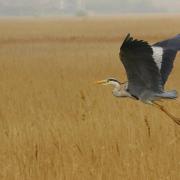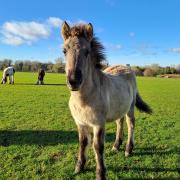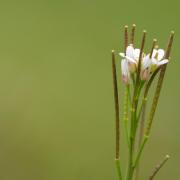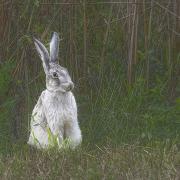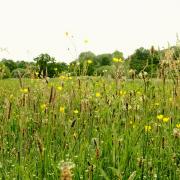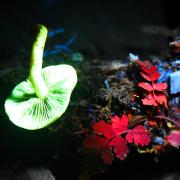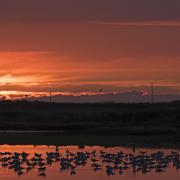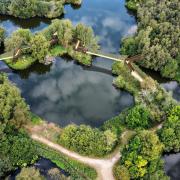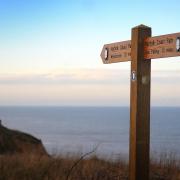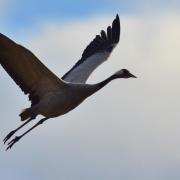For a quarter of a century David Nobbs has trodden the pathways of Wheatfen nature reserve, conserving, observing and maintaining one of Norfolk’s most special and beguiling places for future generations

“These daffodils here have been growing in the same line for nearly 90 years; they were planted by the reserve’s original owner Captain Cockles in 1929,” says David Nobbs, gesturing to a patch of yet-to-bloom flowers emerging from the water. “Every year I symbolically cut some and take them home to put in a vase as my own little tribute to him and this wonderful place.”
In this sodden, recently-cut reed bed it is hard to believe anything grows at all – but having overseen Wheatfen Nature Reserve for 25 years as warden, David knows better than most the magic of this ever-changing, hardy landscape.
He knows every movement of the tidal waters, every bird call which interrupts the mesmerising silence, every new shoot, every change in habit of its residents; his knowledge is encyclopaedic.
Next month, he will finally retire after a quarter of the century as steward of one of Norfolk’s best loved reserves, closing the door on an incredible chapter in Wheatfen’s history.

“I am 66 next week and to be honest I never thought I would be reed cutting and dyke clearing at this age, but I have been very lucky with my health when you consider I have been working in this cold, damp environment with the easterly wind blowing in for all these years,” he laughs.
Wheatfen was the home of naturalist, broadcaster and writer Ted Ellis – one of Norfolk’s most famous residents – and the Ted Ellis Trust was set up by his widow Phyllis following his death in 1986, to ensure Wheatfen remained the special place which had so enraptured him for a lifetime.
“Ted had left a map showing us exactly what the reserve was like in the 1930s with the hope we could return it to that state, as it had become largely inaccessible. It gives me real pleasure because I feel, along with a wonderful team of volunteers here, we have finally realised that dream of Ted and Phyllis.
“We have restored the dykes, the paths, the fen and the water quality here is wonderful now; the waterways are thriving with life. It has seen a dramatic return for the otter, which was such a scarce creature. When you see one in the wild for the first time, it is an incredible thrill and something you never forget.”

Things have changed since those early days. He now has an office; a wooden cabin, with an old-fashioned heater on the wall, glowing red, to keep out the unrelenting cold and damp of the winter.
The walls are littered with photographs and old newspaper clippings reminding everyone of Wheatfen’s significance, and there are books and records, meticulously detailing the extraordinary natural history of the place over the last 50 years.
David started his life in farming but, as agriculture changed, he began to realise his future might lie elsewhere so he began a conservation course at Otley College in Suffolk. As part of that training he took a placement at Wheatfen, where he stayed for several months. When the warden became ill and was unable to return, David found himself stepping in.
“I would never have got the job as warden now, as on paper I really didn’t have any experience,” he laughs. “But I fell in love with the reserve. Phyllis was there alongside me and was a great help in those early years. We got on absolutely fabulously.”

The kettle in David’s office is always on, and that, he says, is part of his promise to Phyllis.
“She very much had an open door policy and would always make visitors a cup of tea, something I promised her I would keep up. So I get the kettle on and have a chat with everyone. It is a very important – and enjoyable - part of my job.
“The reserve has a special place in the hearts of people in Norfolk and Ted’s legacy remains incredibly important today.”
Walking around Wheatfen with David, his deep understanding and connection with the environment which has consumed him for so long is an infectious thing.

“Being in the same place for 25 years you get to know where every thing is – you get to understand the life cycles of species, where and when certain plants flower, and where to spot different things.”
He says certain views on the reserve give him as much joy today as they did at first glimpse.
“Winter coming into spring is my favourite time as everything starts to wake up, but you can still see so much wildlife through the trees, across the reed beds and in the water channels. Cetti’s warblers seem to follow you around with their distinct sharp call, bearded tits watch from the top of reed heads and you see Chinese water deer grazing around the paths.
“On a lovely crisp, bright frosty morning it is magical, especially if the mist is hanging above the water.”

One of the major projects which David has overseen is the major restoration of Thatch Pond thanks to support from Norfolk Country Cottages, which was founded by Ted’s nephew Richard Ellis.
“It is one of my favourite spots and to see the project finished was incredibly important to me. Hopefully it will attract even more wildlife, such as dragonflies, otters and little egrets,” he says.
Beyond the pond is the huge expanse of cut reed bed where wildflowers inexplicably rise from the wetland, creating a carpet of vibrant colour throughout the spring and summer, including Captain Cockle’s daffodils.
“I still cut this reed bed, every year, and take great joy in the task. It is full of flowers, such as flag irises, marigolds, daffodils and so much more. As one type dies, another springs into life to replace it. It really is quite a picture.”

The Ted Ellis legacy
Ted Ellis spent his life devoted to natural history and was passionate about passing on his knowledge. A broadcaster, writer and naturalist, he remains one of Norfolk’s most loved figtures and his meticulous research ensured his reputation extended nationwide.
Although he was born in Guernsey in 1909, his parents were from Norfolk and the family returned to Great Yarmouth when he was a child. For almost three decades he was Keeper of Natural History at Norwich Castle Museum, but it was the 130 acres of woodland, fen and waterways at Wheatfen Broad, at Surlingham, where he lived in a remote cottage with his family, which beguiled him and became his lasting legacy to the county.

Wheatfen, one of the last tidal marshes of the Yare Valley, is a Site of Special Scientific Interest and in recent years, various projects at the reserve have helped fulfil Ted’s ambitions. Not only is it free for the public to explore and enjoy, the Trust has completed the building of a study centre which can be used by conservation and education groups for talks, meetings and workshops, as well as creating a Forest Schools area for local children to enjoy learning in a unique environment.




